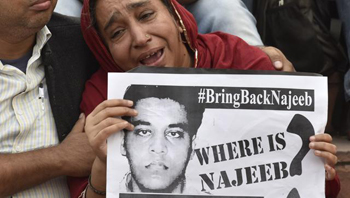New Delhi, Nov 19: A ‘mysterious letter’ delivered at Jawaharlal Nehru University four days ago claims that the missing JNU student Najeeb Ahmad was held captive in a village in Aligarh, reportedly.
 According to media reports, the Delhi Police is probing the letter that was apparently sent by a woman in Aligarh. She claimed to have important information about Najeeb.
According to media reports, the Delhi Police is probing the letter that was apparently sent by a woman in Aligarh. She claimed to have important information about Najeeb.
The letter that was addressed to ‘Ahmed’ was received by the hostel’s president, reportedly. The president however, gave the letter to Ahmed’s mother ‘Fatima’ who later gave it to the Crime Branch.
According to media reports, the woman had written that she had seen Najeeb in a market in Aligarh. The letter further stated that Najeeb sought the woman’s help saying that he had been held captive by some people and had somehow managed to escape. However, by the time the woman could call for help, Najeeb had disappeared, reportedly.
The woman had also mentioned an address in the letter where she could be contacted. However, according to media reports, when the police reached the address, no one could be found.
Reportedly, the letter didn’t mention anything about the village where Najeeb was locked up or about a ransom amount.
The police suspect that it was a prank. However, according to media sources, they are going to find out the location from where the letter was dispatched to be sent to the JNU hostel.
Only recently, the CCTV footage sought by Delhi Police from the Jamia authorities in connection with the disappearance of JNU student Najeeb Ahmed had been found erased as the authorities store a day’s clips for one month, prompting the probe team to seek help from Forensic Science Laboratory (FSL) to retrieve the images.
Meanwhile, the reward amount for providing information on Najeeb’s whereabouts has been increased from Rs 2 lakh to Rs 5 lakh owing to the “sensitivity” of the matter.
Najeeb went missing on October 15 following an on-campus scuffle allegedly with ABVP members the night before.
The case was last week transferred from South District Police to Crime Branch in order to have a “fresh look” at the case.





Comments
and same time Modi anounced Note Ban....there was Shariah issue ...Modi banned Notes ....there was other scams ...Modi same time Bans Notes....WOw what double Mind
Add new comment